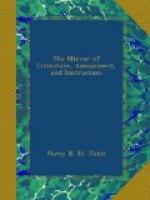The Selector;
and
Literary Notices of
New Works.
* * * * *
RIENZI.
In No. 335, we gave the outline of the story of Rienzi, principally from Gibbon, but interspersed from other authorities. Miss Mitford’s tragedy has since been represented with considerable success, and published. In the preface, we are told, that in addition to the splendid narrative of Gibbon, recourse has been had to “the still more graphical and interesting account of Rienzi’s eventful career,” contained in L’Abbe de Sade’s Memoirs of Petrarque; and that, “as far as the female characters are concerned,” the materials are entirely from invention. All this may appear well enough for the construction of the drama, and the female characters are drawn with peculiar grace and feeling; but we do not see why the character of Rienzi should be so essentially altered from history as it has been; neither do we think that any desirable effect has been gained by this change. In history, Rienzi is a master-spirit of reckless and atrocious daring, but in the drama, he is softened down to a fickle liberty brawler, and the sternest of his vices are glossed over with an almost inconsistent show of affection and tenderness. As he there stands, he is rather like an injured man, than one who so liberally dealt oppression and injustice around him.
Miss Mitford’s tragedy will, however, be read with considerable interest in the closet, and fully to appreciate its beauties, every one who has witnessed it, ought to read it; for many of its “delicate touches” must be lost in the immense area of Drury Lane Theatre.[2] The plot is simple, and is effectively told; but as the newspapers, daily and weekly, have already detailed it, we shall confine ourselves to a few passages, which, in our reading, appeared to us among the many beauties of the drama.
[2] Indisposition has as yet prevented our witnessing the representation of Rienzi; but we have been told by our play-going friends that every scene is listened to with marked attention, and that many passages are judiciously applauded. We are glad to hear this, because it is strong encouragement for other dramatists, and leads us to hope that tragedy-writing may still be revived among us, and that with greater success than has attended many recent efforts.
PROGRESS OF RIENZI’S DISAFFECTION.
Claudia. He is changed, Grievously changed; still good and kind, and full Of fond relentings—crossed by sudden gusts Of wild and stormy passion. Then, he’s so silent— He once so eloquent. Of old, each show, Bridal, or joust, or pious pilgrimage, Lived in his vivid speech. Oh! ’twas my joy, In that bright glow of rapid words, to see Clear pictures, as the slow procession coiled Its glittering length, or stately tournament Grew statelier, in his voice. Now he sits mute—




